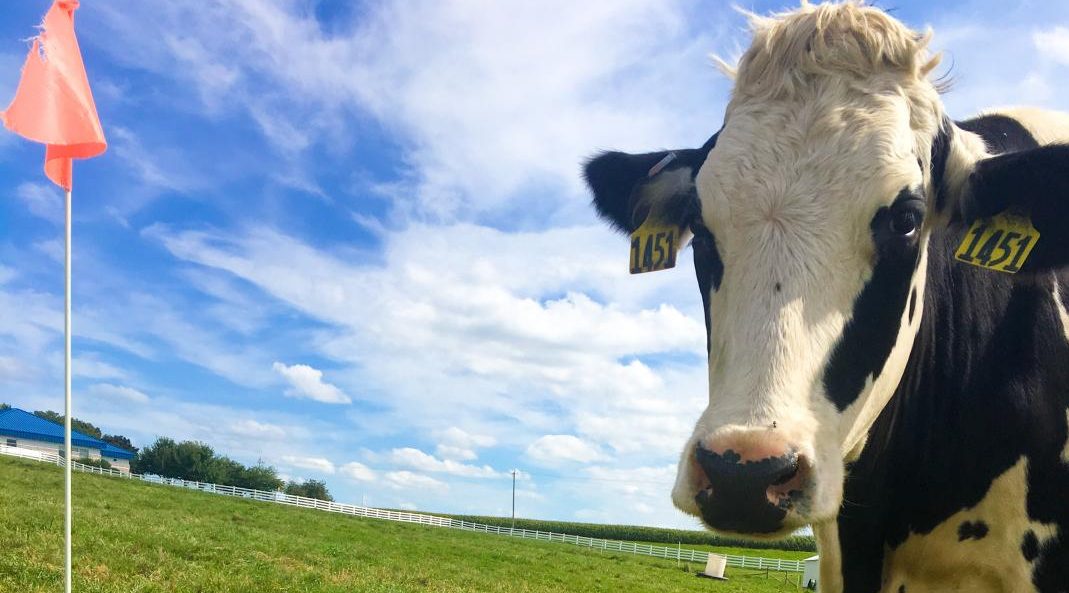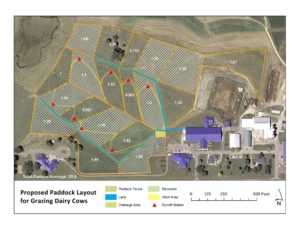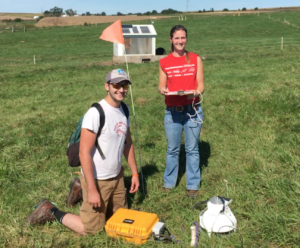UW-Platteville has been awarded a $300,000 grant from the U.S. Department of Agriculture’s National Institute of Food and Agriculture. The three-year grant is part of the Capacity Building Grants for Non-Land Grant Colleges of Agriculture Program. The funding will support the construction of infrastructure necessary to conduct research on grazing-based dairy production systems at Pioneer Farm. As part of this grant, students will examine whether certain grasses increase milk yield and quality.
According to Dr. Dennis Busch, research manager at Pioneer Farm, work on the project has already begun. “We started this spring by getting the infrastructure in place. We drilled improved grass species, installed fencing for the grazing system, and implemented the watering system,” he said. However, the actual experiment will take place next year. Between 30-40 Jersey cattle are expected to arrive at Pioneer Farm in the spring. “The objective is to see how the pastures respond, if there is an increase yield, and if the different grass species will have an impact on cattle that are grazing,” said Busch.
“The grazing dairy livestock research is a timely project that ties in directly with sustainable agriculture at a systems level,” said Dr. Wayne Weber, dean of the College of Business, Industry, Life Science and Agriculture. “At a time when there is projected to be dramatic need for an increased food supply that is safe, and produced through sustainable practices, this research is compelling from the production and environmental side while providing incredible learning opportunities for our students.”
Certainly, this project is relevant to many areas throughout the School of Agriculture and allows for direct student involvement in undergraduate research. Dr. Andrew Cartmill, assistant professor of Soil and Crop Science at UW-Platteville has involved students in an aspect of the research looking at the effects of grazing on soil respiration.
Marissa Miller, junior soil and crop science major from Cascade, Iowa, was one of the students enrolled in Cartmill’s research class this semester. She assisted with data collection and measured the soil CO2 efflux from different pasture mixes. “Learning about grant writing, data collection, data analysis, paper publication and much more really gave me a better understanding of and appreciation for research,” said Miller. “Dr. Cartmill has been so helpful and willing to answer my questions about the how and why of everything we did. The professors’ passion for what they’re doing and their willingness to have a conversation outside the realm of coursework make me thankful for my education here at UW-Platteville.”
“At a time when there is projected to be dramatic need for an increased food supply that is safe and produced through sustainable practices, this research is compelling from the production and environmental side while providing incredible learning opportunities for our students.”
–Dr. Wayne Weber
Dean, College of BILSA
On a broader scale, this research will bring regional, national and global recognition to the university with all the collaborative relationships that already exist. The USDA-Agricultural Research Service, located in Madison, Wisconsin, is one of the collaborators on the project. “There are a number of disciplines involved in this research – from an animal, plant, soil and water perspective – that will broaden this project’s impact,” said Geoffrey Brink, supervisory research agronomist with the U.S. Dairy Forage Research Center. “It also will provide educational benefits of the importance of pasture management, in terms of improving or maximizing animal performance.”
Additionally, the UW-Platteville Pioneer Farm Agro-ecosystem research program is associated with the Global Farm Platform. “This project will have a global impact through assessing the efficacy of grazing dairy herd production in comparison with traditional production at a systems level,” said Weber.
“Is farming sustainable? Can we prove that it is? Is it possible to have a productive grazing herd? This project will contribute to those big picture questions,” said Cartmill.
“The researchers involved in this project are top of the line researchers,” said Weber. “Dr. Busch has established a strong foundation for research through the UW-Platteville Pioneer Farm Agro-ecosystem Research Program, developing a vast network of collaborators with the Global Farm Platform and Long-Term Agro-ecosystem Research networks, along with producer stakeholder networks. Dr. Andrew Cartmill is an active researcher who brings a lot of grant writing and research talent to the team and was key to the development of this grant. Dr. Charles Steiner, through his Pioneer Farm director role and background in agribusiness, brings significant expertise to the financial analysis aspect of the grant.”
Many others have been actively involved to help make this project possible. “The extra efforts of the Pioneer Farm staff, including Justin Daugherty, Diane Jenkins, Randy Mentz, Brian Ostby, Alicia Prill-Adams, Mark Tranel and Cory Weigel, are noteworthy and appreciated,” said Weber. “This is a strong, impressive team.”
As UW-Platteville pursues its vision of being recognized as the leading student-focused university for its success in achieving excellence, creating opportunities, and empowering each individual, it is guided by four strategic planning priorities. The research at Pioneer Farm aligns with the priorities of providing an outstanding education and enriching the tri-states.
Written by: Laura Janisch, Communications, 608-342-1194, janischla@uwplatt.edu



